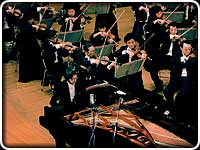|

FANTASIA - RECITATIVO QUASI UNA DANZA
for piano and orchestra
All works of Alberto Bruni Tedeschi are based on one aesthetic standpoint: for him counterpoint is the essential core of musical creativity, as the touchstone of his imaginative powers as a composer. Harmony as to be subordinated to the counterpoint, and the lyrical element results from the overlapping of melodic lines. In this respect Alberto Bruni Tedeschi’ s modern concept opposes the three century tradition of Italian music which allows the melody to dominante. His language is atonal. However, this does not mean that he rejects the laws of tone. On the contrary, he goes beyond them, because this is required by the special needs of his structuring without definitive thematic material. This allows each musical cell to beget the following freely like the spontaneous reproduction of germs. In this manner his works achieve great freedom in form and language serving the exceptional strictness of the musical handwriting.
Moreover, following Stravinsky’s example, Alberto Bruni Tedeschi denies the music priority except for anecdotal passages for illustrating action on the stage. This fact gains more significance from Alberto Bruni Tedeschi being the author of several operas and ballets.
Furthermore, this ‘Phantasy for Piano and Orchestra’ is his first concert. It is very demanding for the pianist, but it is far from being a bravura piece for pianists. One might well say that the piano assumes the role of the ‘primus inter pares’ in this work. Incidentally, this work has an orchestral, chamber musical character (two woodwinds, one trumpet, two French horns, cymbals and strings). Its expressional possibilities and pure lyric are at first only noticeable in the cadences. These are carefully developed and seem to be oases of pure melody in the midst of the ensemble in which the play of sounds, the rhythmic contrasts and dyna- mic opposition are integrated to a polyphonic complex.
Occasionally the score assigns a momentary overweight to other instruments so that a brass instrument suddenly surfaces from the intercoursing sounds. This gives the music a colour of its own and seems like a change of lighting to emphasize the structure of the counterpoint.
The work’s title ‘Fantasia - Recitativo quasi una danza’ describes more exactly the free inspiration which is the basis of this strict architecture. The composer begins by letting his phantasy have free rein while setting up. Then he shifts perhaps to narrative. Finally, the composer prefers to decide on a dance with flowing rhythms in which more likely a state of spi- ritual excitement is to be evoked than a reason given for this state.
The Italian critic, Massimo Mila, is of the opinion that Alberto Bruni Tedeschi’ s musical thought reflects the soberness of our ‘world of steel and concrete’. One thing is certain: the consciousness of the problems of our time has a lasting effect on the composer and gives this phantasy a unique meaning. In this sense, it is a work that is modern in every sense of the word: modern in its intellectual level as well as in its musical quality.
Jacques Bourgeois
|




|
